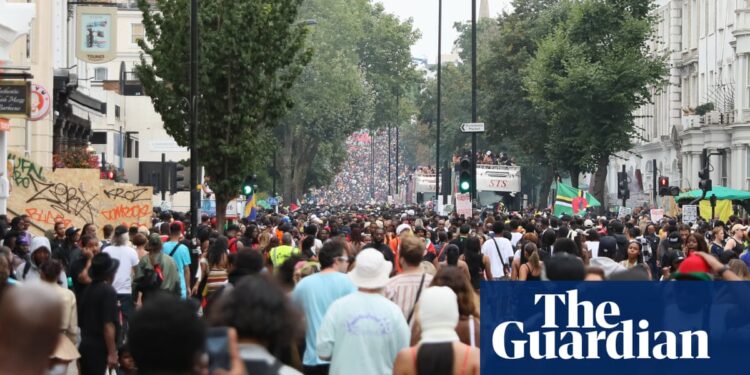Tens of thousands of revellers have turned out to enjoy the final day of this year’s Notting Hill carnival, flooding the streets of west London with colour, dancing and music.
Dancers showed off their flamboyant costumes while floats blasted music for the spectators on the streets of W11. Vendors cooked up a mix of food on open barbecues, as sound systems played everything from rare groove to house, samba, reggae and ska.
More than 1 million people were expected to have attended over the bank holiday weekend, including on Monday’s adults’ day – billed as the culmination of the festival, which was started in 1966 by London’s Caribbean communities.
Posting on X, the mayor of London, Sadiq Khan, described the carnival as “part of the very fabric of our city and an amazing way to bring communities together”. Organisers bill it as “the greatest community-led event on the planet”.
However, as with previous years, the festival has been affected by instances of violent crime. One person was stabbed on Monday, according to the Metropolitan police, and three people were stabbed on Sunday, including a 32-year-old woman who was attending with her child.
She remains in a critical condition, while a 29-year-old man is in hospital in a non-life-threatening condition. A second man, aged 24, who was stabbed discharged himself from hospital.
The Met’s deputy assistant commissioner, Ade Adelekan, who is responsible for policing the historic event, condemned the scenes on Sunday.
Adelekan said: “Yesterday we saw the first day marred by unacceptable violence. Three people were stabbed and we only very narrowly avoided a fatality.
“This was supposed to be ‘family day’ – a celebration suitable for all ages. We are tired of saying the same words every year. We are tired of telling families that their loved ones are seriously injured, or worse. We are tired of seeing crime scenes at carnival. Carnival is a community event and the vast majority of people come to celebrate, to dance, to enjoy music and have a fantastic experience.”
Some attenders were made to walk through metal-detecting “knife arches” as they arrived on Monday, while a police helicopter hovered above throughout the day. There were 249 arrests over the two days, Scotland Yard said.
In an operational briefing document published before this year’s celebrations, the Met described the carnival as a “fixture in London’s cultural calendar”, which comes with significant policing challenges as a “minority use it as an opportunity to commit crime”.
A section 60 order, providing officers with additional search power, will be in force in the carnival area until 2am on Tuesday morning. A section 60AA order is also in force, giving officers the power to order the removal of face coverings being used to conceal a person’s identity.
Posting on X, the Met police federation, which represents the rank and file, said the assaults were “sadly predictable”. Adelekan said he believed people have a moral duty to come forward about the violence.
“It is the responsibility of all who value this event, who want to see it as the celebration it should be, to speak out and speak up about the violence that continues to overshadow it. Whether it is information about a previous incident now under investigation, or information about someone coming to carnival today to commit crime, please tell us,” he said.
Sadly, violent crime is not a rarity at the carnival.
A freedom of information request published by the Met police details the number of stabbings, both fatal and non-fatal, between 2017 and 2023. There were 10 stabbings last year, none of which was fatal. The peak was seen in 2019 when there were 18 stabbings. The lowest number of incidents, seven, was recorded in 2018 and 2022.
All of the stabbings which occurred across that period were non-fatal, save one in 2022.







